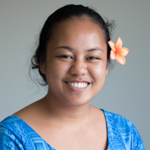Community leaders get training in behavioural health
 By Soli Wilson
•
26 July 2019, 12:00PM
By Soli Wilson
•
26 July 2019, 12:00PM
Improving the way people, their families and communities behave in response to stress is the aim of training for more than 40 community leaders.
Researchers from the Loma Linda University School of Behavioural Health from California, United States are in Samoa for the second time this week, teaching the Crisis Resilience Model (C.R.M.) to community leaders at a workshop held at the National University of Samoa.
Talolo Tua Lepale, of Vailele, the Director for Field Education at the university is a trainer for the programme, being held in conjunction with the N.U.S. and the Samoa Victims Support Group.
"The community resiliency model is a biologically-based model, what that means is that it’s based in understanding the nervous system and [...] how the mind responds to stress like traumas," he said.
Talolo said natural disasters and relationship breakdown can be causes for common trauma in Samoa, the effects of which can be seen through the abuse of substances such as drugs and alcohol as well as increasing suicides here and abroad.
"So the crisis resilience model is to help us better understand our nervous system, how our minds respond and react to traumas or other difficult events in life," he said.
"We train a set of six skills to help folks regulate their nervous system."

The program distinguishes between the part of the nervous system designed to keep us alive and is reliant on responses and the part responsible for higher-order thinking and rationalising difficult events.
"Because what happens is when we have a traumatic event occur, the survival part of the brain activates, the cortex shuts down; it turns off," he said.
"And so what happens then is we lose the capacity to think clearly, we lose the capacity to be able to problem solve effectively and as a result of that we find ourselves doing things and often say things that we regret or wish we hadn’t.
"This is how we find ourselves turning to things such as alcohol, marijuana, drugs and so forth, because that part of the brain is offline," he explained."
Talolo admitted that Samoa has a long way to go before the people are well informed about the model, especially understanding mental health.
"One of the goals for this is that all the people that we have trained - last year through the Adventist Disaster Relief Agency - and this year through N.U.S. - [is for them to] teach these skills to others, families, villages, workplace and so it can spread throughout Samoa."
Talolo said that certain cultural characteristics made Samoans less apt to openly discuss trauma.
"Cultural hurdles: that is just a part of the Fa’a Samoa," he said.
"For instance, we have the tendency to stay quiet, not talk about things, just stay silent about things we struggle with and when we remain silent this can actually be harmful to us.
"When the individual is harmed then it harms the family, when the families are harmed then it harms he community and so you see how that trickles down just throughout our people. And so it’s so important to help that individual within our family, to learn how to build their strength so the strength of the family improve and increases, then the village and Samoa as a whole and overseas."

THE SIX SKILLS FOR WELLNESS AFTER TRAUMA
1) Tracking physical sensations and teaching the identification of positive, negative, and neutral sensations
2) Resourcing to shift towards well-being.
3) Grounding, using contact to return to the present.
5) Gesturing: learning about physical responses through involuntary movements.
4) Help to return to resilience when stress is heightened.
6) Shifting to develop awareness and trust in our ability to return.
Tags
 By Soli Wilson
•
26 July 2019, 12:00PM
By Soli Wilson
•
26 July 2019, 12:00PM







